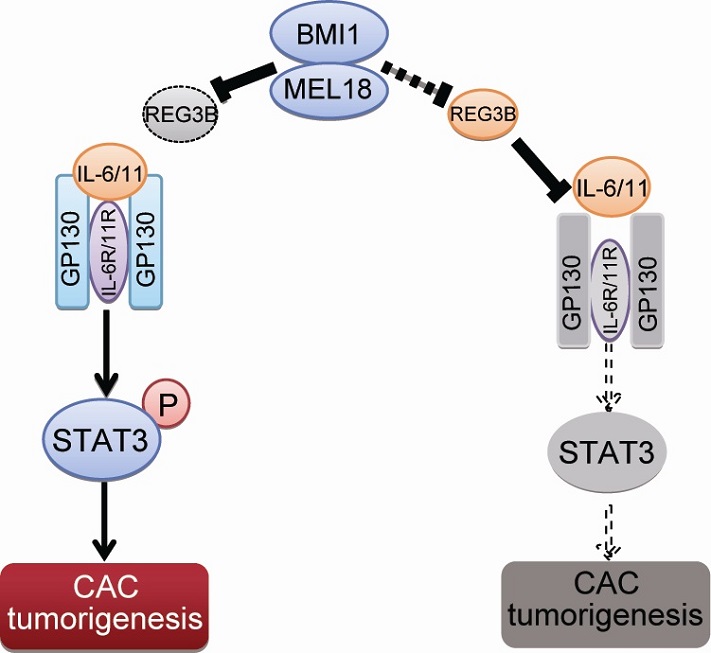Research News
November 27, 2017 –Dr. Rongwen Xi’s laboratory identifies Reg3b as a new tumor suppressor gene targeted by BMI1/MEL18
Publication Date:2017/11/28
November 27, 2017 – Dr. Rongwen Xi’s group at NIBS, Beijing published a research article entitled " BMI1 and MEL18 Promote Colitis-Associated Cancer in Mice via REG3B and STAT3" in “Gastroenterology”. This study identifies Reg3b as a new tumor suppressor gene targeted by BMI1/MEL18 in the experimental model of CAC. Reg3b negatively regulates cytokine-induced activation of STAT3 in colon epithelial cells, consequently, CAC initiation and progression.

Colitis-associated cancer (CAC) is a subtype of colorectal cancer that is commonly preceded by clinically detectable inflammatory bowel disease, such as Crohn's disease or Ulcerative colitis. CAC is difficult to treat, and has high mortality. Polycomb group (PcG) proteins are epigenetic factors that silence gene expression; they are dysregulated in cancer cells and contribute to carcinogenesis by unclear mechanisms. The authors investigated whether BMI1 proto-oncogene, polycomb ring finger (BMI1) and polycomb group ring finger 2 (PCGF2, also called MEL18) are involved in initiation and progression of colitis-associated cancer (CAC) in mice.
The authors first generated Bmi1 and Mel18 conditional KO mice and specifically depleted their function in the intestinal epithelium. Depletion of Bmi1 or Mel18 alone or simultaneously does not significantly affect colonic homeostasis. However, deletion of both genes, but not alone, was able to significantly inhibit tumor initiation and development in the experimental model of CAC. Further, the authors identified Reg3b as a novel PcG target, whose up-regulation is found to be able to inhibit IL-6/IL-11-mediated STAT3 activation. STAT3 activation is known be a critical driver for CAC tumorigenesis.
The triple conditional knock-out experiment revealed that Reg3b is responsible for the tumor suppressive effect following the ablation of Bmi1 and Mel18. Consistent with the genetic relationships, administration of recombinant REG3B significantly suppresses tumor initiation and growth during CAC tumorigenesis, and the effect is largely similar to that caused by ablation of Bmi1 and Mel18. Finally, the authors found that the human REG3β protein, the functional counterpart of mouse REG3B, inhibited STAT3 activity in human 293T cells, and its expression level in colorectal tumors correlated inversely with survival times of patients. The importance of Reg3b repression by BMI1 and MEL18 for tumorigenesis suggests that Reg3b represents another major tumor suppressor locus targeted by PcG proteins. This pathway might be targeted in patients with colitis to reduce carcinogenesis.
Dr. Xicheng Liu, a postdoctoral research associate, is the first author of the paper. Other contributing authors include researchers from the National Institute of Biological Sciences, Beijing and the Fourth Military Medical University, Xi’an, and Dr. Rongwen Xi is the corresponding author. This work was supported by grants from the Ministry of Science and Technology of China, the National Natural Science Foundation of China, and the municipal government of Beijing, and was carried out at the National Institute of Biological Sciences, Beijing.



